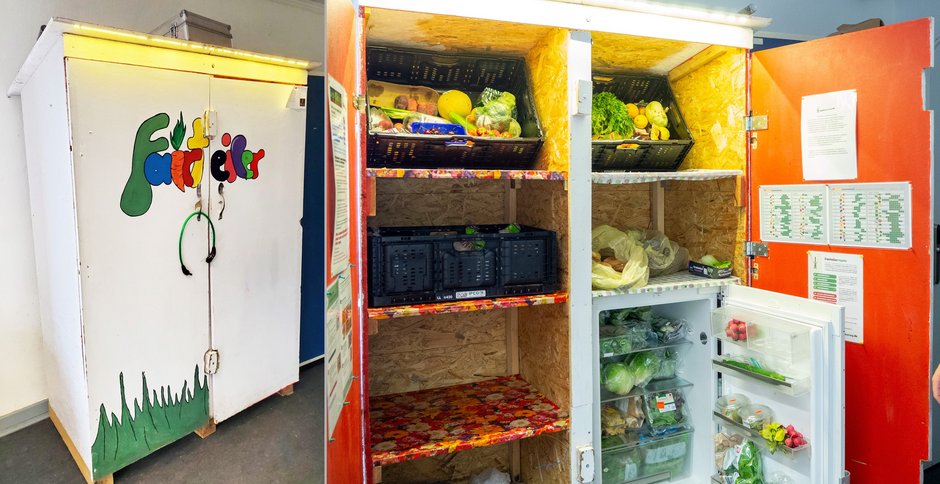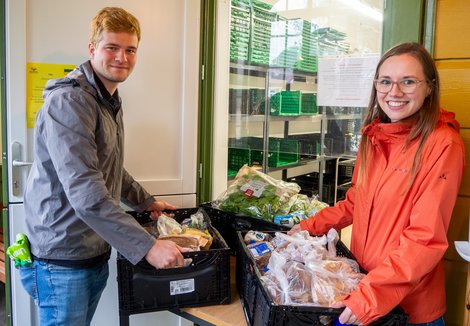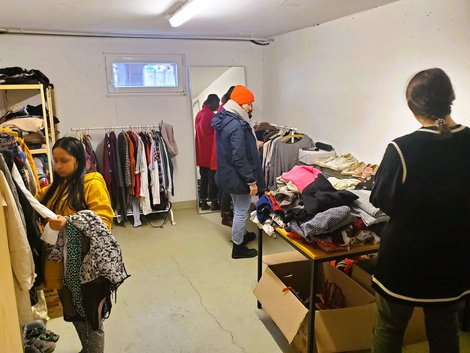- with food sharing and second-hand clothing
Clausthal University of Technology is the University of the Circular Economy, the resource-efficient circular economy. Research and teaching at the university revolves around this overarching theme. Two TU student initiatives show how the circular economy can be integrated into everyday life. They are campaigning against the waste of resources with food sharing and clothes swapping.
Saving food through food sharing
Fruit, vegetables, bread rolls or pre-packed cold cuts: the choice is huge when I accompany Annika Hoppe and Michael Meyerle from the food sharing initiative in Clausthal. The two are among around 20 volunteer members who save food from being thrown away. Every Wednesday and Friday, they collect food that could not be given to people in need at the food bank and distribute it via Foodsharing.
"With Foodsharing, we save food from the garbage can and are committed to combating waste and conserving resources," explains Annika. She studied at the TU and now works at the Institute for Processing, Recycling and Circular Economy Systems. Annika was one of the first people in Clausthal to get involved in food sharing. She got to know the concept in Kassel during her bachelor's degree. When she moved to Clausthal for her Master's degree, she noticed that there was still no active group here. Together with other students, she therefore founded the local food sharing district over three years ago.
How does food sharing work?
Clausthal-Zellerfeld is one of 54 active districts in Lower Saxony where volunteers organize themselves to rescue food. Foodsharing has existed as a nationwide initiative since 2012 and there are now a total of 473 districts across the country. Anyone who registers free of charge via the foodsharing.de platform can take part. You can get involved at various levels within the group: As a so-called "food sharer", you simply pick up food yourself and use it up. If you want to get even more involved, you can also help distribute the food as a "food saver".

Annika and Michael are registered as "ambassadors" in Clausthal. They coordinate the group and organize the collection of food donations and transport to the so-called "Fairteiler". In the food sharing community, the "Fairteiler" is the place where members can collect the donated food. In Clausthal, it is located in the student center (StuZ) in Silberstraße. The large cupboard with an integrated fridge was set up by the volunteers. Twice a week, they sort the new donations there and inform all "food sharers" about what food they can find in the "Fairteiler".
More food rescuers are needed
Members can then take what they can use from the cupboard. Since the food sharing group was set up in Clausthal-Zellerfeld, the service has been very well received. Students in particular like to use the free "Fairteiler". However, the concept is fundamentally based on the idea of sustainability: food sharing aims to reduce waste and increase the appreciation of food.
Annika and Michael would therefore be delighted if more people would like to get involved in the initiative. In particular, they are looking for volunteers to collect the food donations as "food savers". To make this possible for everyone without a car, the group has even converted a handcart for transportation. So if you would like to get involved with food sharing, please contact Annika and Michael by email: clausthal-zellerfeld@foodsharing.network
With clothes swaps against fast fashion
Another project launched by students follows the circular principle: the "clothes swap party" in hall of residence VI in Leibnizstraße.
"The idea behind our swap party is that we want to extend the lifespan of clothes through second-hand life and at the same time reduce the negative effects of fast fashion," says Annika. About two years ago, she launched the clothes swap together with friends. With the support of the Studierendenwerk, which provided a room, they set up a place for the exchange in the basement of the student residence. There are many well-preserved treasures spread out on clothes racks and shelves.
Hand in and find second-hand clothes
The friends started with their own discarded clothes. In the meantime, the cellar room has filled up thanks to many donations and offers a large selection of women's and men's clothing. The "clothes swap party" offers anyone interested the opportunity to hand in clothes and browse the shelves for free second-hand items. The only requirement: the clothes must be in good condition.
So far, the clothes swap has often taken place spontaneously, depending on whether someone was able to look after the room. From this winter semester, the clothes swap will take place every last Wednesday of the month from 7:30 pm. Anyone who would like to volunteer and support the initiative is always welcome. The next date and more detailed information about the "clothes swap party" will also be communicated in the announcements on StudIP.
Do you have any questions, suggestions or a topic proposal? Then write me an e-mail: blog@tu-clausthal.de


